2020年人教版高中英语必修三Unit1语法导学案 无答案
2020年新人教版高中英语必修三导学案全套

2020年人教版高中英语必修三导学案全套Unit 1 Festivals and celebrationsListening and speaking & Listening and talking 导学案【学习目标】1.掌握与节日相关的新词汇:lantern,Carnival,costume,dress (sb) up,march,congratulation,congratulate,riddle,ceremony,samba,make-up,after all。
2.了解世界上重大节日的起源和庆祝这些节日所举行的活动以及举行活动的意义;3.通过听和谈论世界各地传统节日,提高对该话题的听力理解和口语表达水平;4.通过看有关世界各地不同传统节日的图片、视频等,提高对该话题的理解能力;5.复习英语语音里常见的同化现象,能分辨自流中同化的音素,并在口头表达时自觉运用同化技巧。
【学习重点】1、引导学生在听的过程中关注说话人的态度,辨别人物之间的关系;2、启发学生结合已有背景知识,运用话题词汇来描述节日活动。
【学习难点】在听的过程中正确理解说话人的态度,准确辨别人物之间的关系。
【学习过程】一、课前预习1、词汇积累(核心单词+重点短语)A)核心单词B)重点短语2.Brainstorming:There are many different festivals in our country. Which festivals do you like?二、Pronunciation1. The change in the pronunciation of the bold letters.①d uty, e d ucation ②u s e, u s ually ③new s, new s paper ④i s, i ss ue⑤las t year ⑥i n bed ⑦tho s e shirts ⑧a s you see2. The change in the pronunciation of the consonants in the sentences.①Di d you enjoy the holiday?②Miss, congratulations o n becoming an adult!③It’ll be too tiring to walk or dance for a long time in tho s e shoes.④I was hoping to hear tha t you had a great time throughout.⑤Children then take part in Easter egg hunts to find the eggs and wi n prizes.⑥I n Mexico, the Day of the Dead is celebrated between October 31st and November 2nd.三、Language points1.dress (sb) up 穿上盛装;装扮【例句】Did you dress up for the occasion?是否曾为重大场合而精心打扮?【归纳拓展】dress up as... 装扮成……;打扮成……dress oneself 自己穿衣be dressed in 穿着……(表示穿的状态)【小试牛刀】①She loved to dress _____ and she reveled in the attention bestowed up herfrom the other students.她喜欢精心打扮,陶醉于其他学生对她的注意。
2020学年人教版高中英语必修三Unit1单词导学案
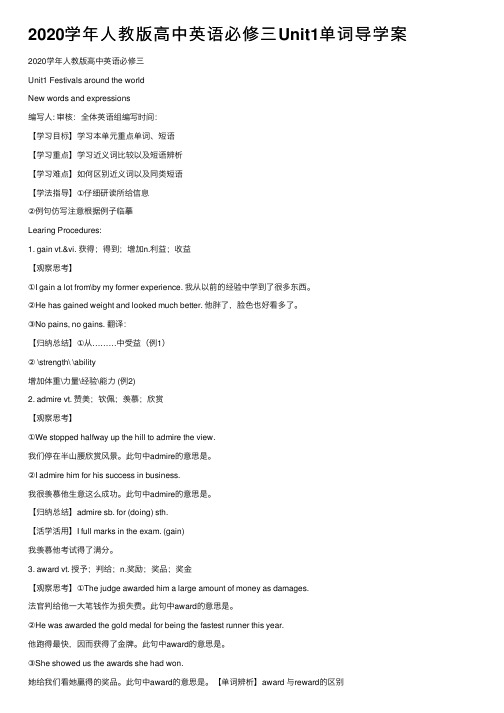
2020学年⼈教版⾼中英语必修三Unit1单词导学案2020学年⼈教版⾼中英语必修三Unit1 Festivals around the worldNew words and expressions编写⼈: 审核:全体英语组编写时间:【学习⽬标】学习本单元重点单词、短语【学习重点】学习近义词⽐较以及短语辨析【学习难点】如何区别近义词以及同类短语【学法指导】①仔细研读所给信息②例句仿写注意根据例⼦临摹Learing Procedures:1. gain vt.&vi. 获得;得到;增加n.利益;收益【观察思考】①I gain a lot from\by my former experience. 我从以前的经验中学到了很多东西。
②He has gained weight and looked much better. 他胖了,脸⾊也好看多了。
③No pains, no gains. 翻译:【归纳总结】①从………中受益(例1)② \strength\ \ability增加体重\⼒量\经验\能⼒ (例2)2. admire vt. 赞美;钦佩;羡慕;欣赏【观察思考】①We stopped halfway up the hill to admire the view.我们停在半⼭腰欣赏风景。
此句中admire的意思是。
②I admire him for his success in business.我很羡慕他⽣意这么成功。
此句中admire的意思是。
【归纳总结】admire sb. for (doing) sth.【活学活⽤】I full marks in the exam. (gain)我羡慕他考试得了满分。
3. award vt. 授予;判给;n.奖励;奖品;奖⾦【观察思考】①The judge awarded him a large amount of money as damages.法官判给他⼀⼤笔钱作为损失费。
2019-2020年人教版高中英语必修三Unit 1《Festivals around the world》语法导学案

2019-2020年人教版高中英语必修三Unit 1《Festivals around theworld》语法导学案一、学习目标(Learning aims):使学生掌握各个情态动词的基本用法二、学习重点(Important points):区分语气相近的情态动词三、学习难点(Dif ficult points):如何正确运用各个情态动词四、语法品味(体会一下我们生活中用到的情态动词吧!)1. 在乌云密布的天气:You had better take an umbrella in case it rains.2. 在课堂上:You should listen to the teacher carefully.3. 遇到陌生人问路:Can you tell me where the supermarket is?4.遇到意外情况:His bike is broken. He has to walk to school.五、总结提升(通过以上例句,你觉得情态动词是啥东东呢?)六、概念概述情态动词表示说话人的某种语气或感情,不能单独作谓语,必须和行为动词或连系动词一起构成谓语。
情态动词没有人称和数的变化。
(be able to/have to例外)七、想一想(到目前为止你都见过那些情态动词呢?)八、练一练(写出以下情态动词的过去式及否定形式)1.Can2. may3.will4. shall5.must6. need7.dare 8. have to9.had better 10. ought to九、常用情态动词总汇can / co uld / be able to may / might will / would (used to)shall / should (ought to) must / have to need / dare十、重点讲解一)、can 和could (be able to)1.表示能力,意为“能,会”, could 为can 的过去式。
2020年人教版高中必修三英语Unit1语法复习学案设计
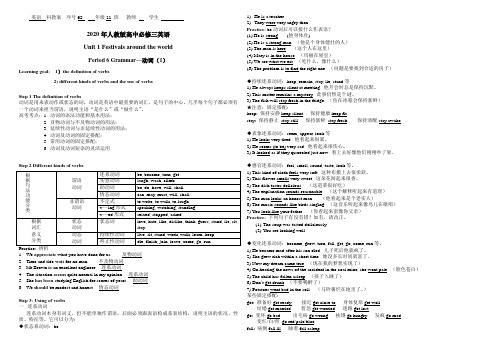
英语科教案序号62 年级11 班教师学生2020年人教版高中必修三英语Unit 1 Festivals around the worldPeriod 6 Grammar—动词(1)Learning goal: 1)the definition of verbs2) different kinds of verbs and the use of verbsStep 1 The definition of verbs动词是用来表动作或状态的词,动词是英语中最重要的词汇,是句子的中心。
几乎每个句子都必须有一个动词来担当谓语,说明主语“是什么”或“做什么”。
高考考点:1. 动词的语法功能和基本用法;2. 及物动词与不及物动词的用法;3. 延续性动词与非延续性动词的用法;4. 动词及动词的固定搭配;5. 常用动词的固定搭配;6. 动词及动词短语的灵活运用Step 2 Different kinds of verbs根据句法功能分类谓语动词连系动词be, become, turn, get实意动词laugh, wash, climb助动词be, do, have, will, shall情态动词can, may, must, will, shall非谓语动词不定式to write, to walk, to laughv.—ing形式speaking, watching, standingv.—ed形式seized, stopped, asked根据词汇意义分类状态动词状态词love, hate, like, dislike, think, guess, stand, lie, sit,stay动态动词持续性动词live, sit, stand, work, walk, learn, keep终止性动词die, finish, join, leave, come, go, run1.We appreciate what you have done for us. 及物动词2.Time and tide wait for no man. 不及物动词3.Mr Brown is an excellent engineer. 连系动词4.The situation seems quite normal in my opinion. 连系动词5.She has been studying English for scores of years. 助动词6.We should be modest and honest. 情态动词Step 3: Using of verbs一. 连系动词连系动词本身有词义,但不能单独作谓语,后面必须跟表语构成系表结构,说明主语的状况、性质、特征等。
2020年人教版高中必修三英语Unit1第一课时导学案设计 (无答案)

2020年人教版高中必修三英语Unit1 Festivals around the world (Words)学科:英语必修3 课时:第1课时主编人:审编人:高一英语备课组班级:学习小组:姓名:评价:一、学习目标1、掌握课前预习中的词汇和短语;2、结合课文句子,掌握其中的词汇、短语和句型等语言知识及其用法。
二、自主学习Ⅰ. 重点词汇1. ______ vi. &vt. (使)饿死; 饿得要死2. _____ vt. 擦; 揩; 擦去3. _______ n. 习惯; 风俗4. _____ n. 诡计; 恶作剧; 窍门vt. 欺骗; 诈骗5. ______ vt. &vi. 搜集; 集合; 聚集6. _______ adj. 明显的; 显而易见的7. _______ vt. 提醒; 使想起8. ____ vt. 获得; 得到9. ______ n. 奖; 奖品vt. 授予; 判定10. __________ n. 庆祝; 祝贺→________ v. 庆祝; 祝贺11. ________ adj. 宗教上的; 信奉宗教的; 虔诚的→_______ n.宗教信仰12. _____ n. 信任; 信心; 信仰→______ vt. 相信13. ____________ n. 独立; 自主→___________ adj. 独立的; 自主的14. _______ vt. 赞美; 钦佩; 羡慕→__________ n. 钦佩; 羡慕15. __________ n. 许可; 允许→______ vt. 允许16. ________ vi. 道歉; 辩白→_______ n. 道歉17. ______vt. 原谅; 饶恕→__________ n. 宽恕; 原谅18. ______ n. 到来; 到达; 到达者→______ vt. 到达19. __________ n. 农业; 农艺; 农学→___________ adj. 农业的; 农艺的20. ________ adj. 充满活力的; 精力充沛的; 积极的→______ n. 精力, 活力Ⅱ. 重点短语1. _________发生2. ____________ 纪念; 追念3. ________ 穿上盛装; 打扮; 装饰4. ______________ 期望; 期待; 盼望5. _______________ 屏息; 屏气6. ______ 出发; 动身; 使爆炸7. _______ 出现; 到场8. ______________ 守信用; 履行诺言9. ______________ 使……想起……10. _________搞恶作剧; 诈骗; 开玩笑11. ___________ 好像12. ____________ 玩得开心13. ____________ 日夜; 整天14. __________ 为……而自豪三、合作探究Ⅰ. 用所给词的适当形式填空1. The hotel had a grand _________ (celebrate)for its opening.2. Jesus was the founder of the Christian _________ (religious).3. They will stick up for their _________ (belief).4. You should learn to be _________ (independence)of your parents.5. I have great _________ (admire)for his courage.6. I like to take some _________ (energy)exercise at weekend.7. He made an _________ (apologize)to me for hurting my feelings.8. The old farmer prays God’s _________ (forgive).9. That state is classed as an _________ (agriculture)area.Ⅱ. 用以上短语的适当形式填空1. She _________ on a trip across Europe.2. We named the lake Rebecca _________ her.3. He looked at me _________ I were mad.4. We _________ the return of spring.5. The accident _________ at the crossroads.6. For some reason she didn’t _________ .7. We _________ them and they fell right into it.8. Children like to _________ as ghosts.9. Christmas is a time to _________ decorations.10. He decided to go to Paris _________ London.四、训练反馈I. 单句语法填空1. Look! There is a___________boy in the river. He will be___________to death before the adults come to save him. (drown)2. She___________(apologize)for having to leave at 3: 30 pm.3. Do you know when India gained its___________(independent)from Britain?4. He got a lot of___________(award)for his excellent study.5. Do be careful with those fireworks; the slightest spark could set them ________.6. Please turn___________the radio. I want to listen to the news.7. In my opinion, we couldn’t forgive some actors___________taking drugs.8. Fred got very angry when the other boys played a trick___________him and hid his clothes.9. ___________the Internet is of great help to us, I don’t think it is a good idea to spend too much time on it.10. I___________(keep)my word, and I’ll tell him everything.II.单句改错1. Reminding not to miss the flight to Paris, he set out for the airport in a hurry. ___________2. Being forgiven at the past is the most precious gift we can receive.___________3. She tricked me on paying for her meal at the restaurant.___________4. It must be something wrong with the machine.___________5. I owe Mike an apology to what I said and did to him.___________6. He was unable to come to the ceremony, but he sent his son to accept the award in place.___________7. Be careful! The bomb could be set out by the slightest touch.___________8. When I like the sweater on sale, I didn’t take money with me.___________9. All the citizens, young and old, walked and sang, beautifully dressing in new clothes of all kinds, celebrating the success of their football team.___________10. The clouds are gathering. It looks as if the sky is falling down.___________五、课后反思。
2020年人教版高中英语必修三Unit1阅读导学案 无答案

2020学年人教版高中英语必修三Unit1 Festivals around the world导学案Reading1.Skim the reading passage and then finish the exercises. (5mins)(1). What is the general idea of the passage?A. Ancient Festivals.B. Festivals around the world.C. Festivals to honor people.D. Harvest Festivals.2.Read for more details: Choose the best answer (10mins)1). Part 1 Paragraph 1 Ancient Festivals(2).Which of the following can’t most possibly be origin of festivals?A. Religious issuesB. Seasonal changesC. The stories of great peopleD. The happy lives of ancient people(3). Why did ancient people celebrate after hunters had caught animals?A. Because they had no food to eat except animals.B. Because they wouldn’t go hungry when food was found.C. Because animals were their favorite food at that time.D. Because they wanted to show their admiration for the hunters.2).Part 2 Paragraph 2 Festivals of the dead(4).Why do Japanese people light lamps during the Festival of the Dead?A. Because they want to make the festival colorful.B. Because they want to light up their rooms.C. Because they want to light up their way.D. Because they want to lead their ancestors to return to earth.(5).The word Satisfy in paragraph 2 meansA. pleaseB. relaxC. memorizeD. honor3).Part 3 Paragraph 3 Festivals to Honor People(6).Which of the following was NOT mentioned as a famous person in the text?A. Mohandas Gandi.B. Christopher Columbus.C. Abraham Lincoln.D. Qu Yuan.4). Part 4 Paragraph 4 Harvest Festivals(7).Chinese people usually do the things in Mid-autumn Festival EXCEPTA. Families get togetherB. Enjoy moon cakesC. Carnival paradeD. Admire the moon5). Part 5 Paragraph 5 Spring Festivals(8). Which is TRUE about the Easter mentioned in the text?A. It is only a religious festivalB. It is a festival for AmericanC. It celebrates the return of Jesus form the deadD. It also celebrates the end of cold winter.(9).What’s the right time order of the following festivals?a. Easterb. Cherry Blossom Festivalc. Western carnivalsA. c; a; bB. c; b; aC. a; b; cD. a; c; b(10). This text is most probably taken from ?A. MagazineB. News paperC. Guide of World FestivalsD. Travel journalPost-reading1). Retell the text by filling the following blanks (5mins)There are all kinds of festivals and __________ around the world, which are held for different reasons. The ancient festivals were mainly held at three times a year--- the end of the cold _____, planting in spring and ______in autumn. Some festivals are held to _____ the dead or satisfy the _________ in case they might _____ _______, while other festivals are held to honor famous people, such as Dragon Boat Festival and Columbus Day.Harvest and Thanksgiving festivals are happy events because the food is _________ for the winter and because a season of ___________ work is over, to which Mid-autumn festival belongs. And the most _________ and important festivals are the ones that look forward to the end of winter and to the ______ of spring, such as the ______ New Year, at which people have a very good time.2). Group work: discussionWhy do people celebrate festivals around the world?Homeworkand friends gather to eat and give thanks for their blessing.Thanksgiving Day is really a harvest festival. This is why it is celebrated in late fall, after the crops are in. But one of the first thanksgivings in America had nothing to do with a good harvest. On December 4, 1619, the Pilgrims from England landed near what is now Charles City, Virginia. They knelt down and thanked God for their safe journey across the Atlantic.The first New England Thanksgiving did celebrate a rich harvest. The Pilgrims landed at what is now Plymouth, Massachusetts, in 1620. They had a difficult time and the first winter was cruel. Many of the Pilgrims died. But the next year, they had a good harvest. So Governor Bradford declared a three-day feast(盛宴). The Pilgrims invited Indian friends to join them for their special feast. Everyone brought food.In time, other colonies(殖民地)began to celebrate a day of thanksgiving. But it took years before there was a national Thanksgiving Day. During the Civil War, Sarah Josepha Hale persuaded Abraham Lincoln to do something about it. He proclaimed(宣布)the last Thursday of November 1863 as a day of thanksgiving. Today, Americans celebrate this happy harvest festival on the fourth Thursday in November. Canadians celebrate Thanksgiving Day in much the same way as their American neighbors. But the Canadian thanks-giving Day falls on the second Monday in October.56. The passage mainly tells us .A. How Thanksgiving Day is celebrated in the U. S. A.B. How Thanksgiving Day came into being and the different ways it is celebratedC. That Thanksgiving Day is in fact a harvest holidayD. How the way to celebrate Thanksgiving Day changed with the time and places57. Thanksgiving Day is celebrated .A. in springB. summerC. in autumnD. in winter58. The first to celebrate thanksgiving were .A. some people from EnglandB. the American IndiansC. Sarah Josepha HaleD. Governor Bradford59. We can infer from the passage that New England must be .A. in the U. S. A.B. in Great BritainC. in CanadaD. on some island off the Atlantic60. Which of the following is NOT true?A. Thanksgiving Day used to be a holiday to celebrate a good harvest.B. Abraham Lincoln was not the first to decide on thanksgiving celebrations.C. Thanksgiving Day is celebrated to express the American and Indian people’s thanks to God.D. There’s little difference betw een the American way and the Canadian way to celebrateThanksgiving Day.。
2020年人教版高中必修三英语Unit1全单元教案设计(无答案)

2020年人教版高中必修三英语Unit1 Festivals around the worldPeriod1 Speaking and warming upI.learning aims:Knowledge goal: learn or review the new words and phrases: take place celebrate beauty harvest arival in memory of found dragon relativeAbility goal : Enable the Ss to talk about festivals.Emotional goal: make the Ss love life and learn to enjoy life.II.learning importance:Learn about the words or expressions about festivals.III. Learning steps and methods:Step1Lead in(10′)Ask the Ss, Do you know any festivals? (Tomb-sweeping Day Lantern Festival Dragon Boat Festival Army Day Double-seventh Day Valentine’s Day Easter)Say ,Today we’ll talk about some Chinese festivals.Method: Heuristic teachingStep2 Warming up (Page1 in Book1) (10′)Discuss the following questions with your partners:1.When does the Spring Festival take place?2.What do people do on the Spring Festival?3.What does it celebrate?Have the Ss talk about the three festivals, the Spring Festival Dragon Boat Festival National Day. Then try to finish the chart. Methods: disscuss in groups and presentStep3 Sum up the important vocabulary. (10′)festival celebrate take place beauty harvest arivalin memory of found dragon relativeStep4 Homework1.Remember the keywords and phrases.2.Preview the reading passage:Festivals and celebrations教后记:1.备课除了备好教材,更应充分备好教学对象、即学生。
2020年人教版高中必修三英语Unit1语法导教案设计.doc
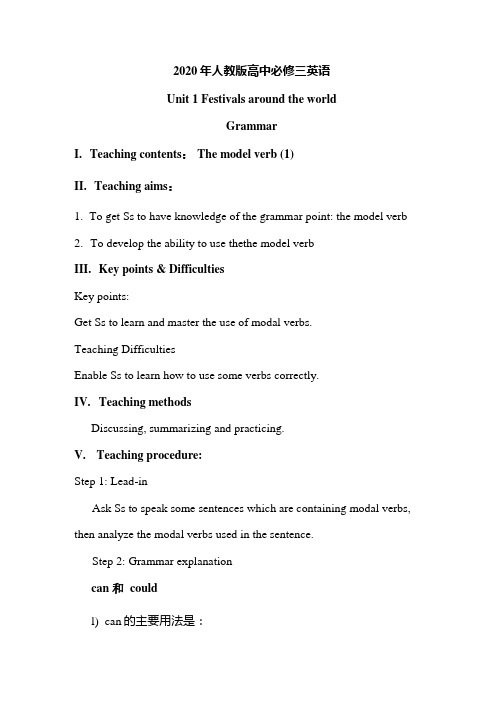
2020年人教版高中必修三英语Unit 1 Festivals around the worldGrammarI.Teaching contents: The model verb (1)II.Teaching aims:1.To get Ss to have knowledge of the grammar point: the model verb2.To develop the ability to use thethe model verbIII.Key points & DifficultiesKey points:Get Ss to learn and master the use of modal verbs.Teaching DifficultiesEnable Ss to learn how to use some verbs correctly.IV.Teaching methodsDiscussing, summarizing and practicing.V.Teaching procedure:Step 1: Lead-inAsk Ss to speak some sentences which are containing modal verbs, then analyze the modal verbs used in the sentence.Step 2: Grammar explanationcan 和couldl)can的主要用法是:A.表示体力或脑力的能力: e.g. The girl can dance very well.B.表示说话的推测、事物的可能性等:e.g. Can the news be true?C.在口语中,can可以表示请求或允许:e.g. Can I sit here?can表示"能够”时与短语be able to同义,但can只用于一般现在时或过去时,而后者可用于各种时态。
2020年人教版高中必修三英语Unit1第二课时导学案设计(无答案)

2020年人教版高中必修三英语Unit 1 Festivals around the world 导学案Period 2 (文本研读课)Learning aims(学习目标):1、To improve the ability of reading2、To learn something about the festivals around the worldImportant points(学习重点):To analyse the whole passage and know about the structure and the mainidea of the passageDifficult points(学习难点):How to improve the skills of reading:1、略读或浏览阅读2、扫描式阅读Learning guide(方法导引):Read, analysing and comprehendingLearning Procedures(学习过程):Step 1:Try to remember the new words as quickly as possible(温馨提示:说一千,道一万,记住单词是关键!)1、Read and recite the new words and phrases three times.(方法导引:按音标正确读、背单词和短语)(A级)2、Copy the new words and phrases three times(方法导引:汉语只需要抄一遍:抄写后要求会默写这些单词和短语)(A级)____________________________________________________________________________________ ____________________________________________________________________________________ ____________________________________________________________________________________ ____________________________________________________________________________________ ____________________________________________________________________________________ ____________________________________________________________________________________ ____________________________________________________________________________________ ____________________________________________________________________________________ ____________________________________________________________________________________ ____________________________________________________________________________________ ____________________________________________________________________________________ 学习反思:我的单词默写情况:()一般()()Step 2:Skim the reading passage Festivals and Celebrations quickly and get the main idea of it(方法导引:略读或浏览阅读文章,忽略不懂的句子和生词,快速阅读原文,目的只是为了了解阅读材料的内容大意,不求甚解,结合题目找出主旨)(B级)A.The passage talks about what festivals and celebrations are connected with.B.The passage is about why people like to celebrate festivalsC.The passage tells us different kinds of festivals with the reasons for them,when they take place andhow people celebrate themD.The passage is about how people in different countries celebrate their festivals学习反思:Can you get the main idea by yourself? Have you learned how to get the main idea of this kind ofpassage?________________________________________________________________________________________________________________________________________________________________________Step 3:Fast-reading (方法导引:先浏览下面的表格,了解需要找到的信息,再进行有选择有目的的快速阅读,目的是寻找某些资料或信息,对于无关部分可以忽略)(B级)Kinds of Festivals Names of Festivals CountriesFestivals of the DeadFestivals to Honour PeopleHarvest FestivalsSpring FestivalsStep 4:Careful-reading Read the reading passage carefully again and try to find out the answers to thefollowing questions(方法导引:先了解需要完成的任务,再大声朗读课文,注意语音、语调、断句正确的同时捕捉相关的信息,不理解的单词,短语或句子可以求助词典,同学或老师)(C级)1.What are festivals of the dead usually for?____________________________________________________________________________________2.Why are autumn festivals happy events?____________________________________________________________________________________ 3.What do people usually do at spring festivals?____________________________________________________________________________________ 4.Why is it important to have festivals and celebrations?____________________________________________________________________________________ 学习反思:我真的按老师的要求读课文了吗?我真读了吗?_____遍()一般()()Step 5:Reading Comprehension(方法导引:课上定时训练,利用本节课所学略读、浏览阅读及扫描式阅读的方法快速准确找到自己所需要的信息)A holiday is any day when people lay aside their ordinary duties and cares.The word comes from Old English. At first, holidays honored some holy event or person. People in Great Britain and other countries speak of holidays as Americans speak of vacations.Every nation has its special holidays. China observes New Year’s Day(January 1),May Day and National as legal holidays, as it was on Oct.1,1949 that People’s Republic of China was founded. The Chinese have long celebrated the Chinese lunar year. In the United States, congress has declared several as legal days such as New Year’s Day (January 1);Martin Luther King,Jr’s Birthday,Washington’s Birthday; Thanksgiving Day and Christmas Day and so on. Some holidays celebrate special events in the development of a country, such as Greece’s Independence Day;Italy’s Liberation Day and India’s Independence Day.In the States, banks and schools usually close on a legal holiday. When such a holiday falls on Sunday, the following Monday is usually observed. Schools and organizations often celebrate days known as traditional holidays, although schools and business do not close then. Those holidays include Valentine’s Day and Halloween.1.Which of the following holidays has nothing to do with a country’s development?A.China’s National DayB.Valentine’s DayC.Italy’s Liberty DayD.America’s Independence Day2.From the passage we can infer that _______.A.Chinese will no longer observe the Spring FestivalB.students don’t have to go to school on any holidayC.Chinese and Americans share at least one holidayD.Americans can easily draw money from the banks on legal days3.In the senten ce “China observes New Year’s Day(January 1)”,“observe” means _____.A.praiseB.spendC.celebrateD.careStep 6:Quiz(当堂检测方法导引:先回忆一下本节课所读课文主旨及主要内容,再读题做题)1.Which of the following is NOT true about the Western holiday Halloween according to the reading passage?A.It has its origin as an event to memorize the deadB.It is now popular among the children.C.The children might play tricks if they are not given anything.D.The children will put on their best clothes to make people happy.2.Which of the following festivals is used to honor someone?A.The New YearB.The Spring FestivalC.The Dragon Boat FestivalD.The Mid-Autumn Day3.What’s the purpose of the national festival on October 2 in India?A.To gain IndependenceB.To meet New YearC.To honor the deadD.To honor Mohandas Gandi4.Which of the following is a happy event?A.Thanksgiving festivalB.Columbus DayC.The Dragon Boat FestivalD.Both A and B5.Which of the following is NOT true according to the Spring Festival?A.To eat dumplingsB.To make the ancestors happyC.To give children lucky moneyD.To eat fish and meatAn English joke:Not to Be Taken OutMark Twain once went to borrow a certain book from a neighbour in Tarry town. “ May I borrow a book from you? ” he asked politely. “ Yes, you're more than welcome to it, ” the neighbour told him. “ But I must ask you to read it here. You know I make it a rule never to let any book go out of my library. ”Some days later the neighbour wished to borrow Mark Twain's machine for cutting grass in the garden. “ Why, certainly, ” Mark Twain told him. “ You're more than welcome to it. But I must ask you to use it here. You know that I make it a rule never to let it go out of my garden. ”。
2020年人教版高中必修三英语Unit1语法复习学案设计

英语科教案序号62 年级11 班教师学生2020年人教版高中必修三英语Unit 1 Festivals around the worldPeriod 6 Grammar—动词(1)Learning goal: 1)the definition of verbs2) different kinds of verbs and the use of verbsStep 1 The definition of verbs动词是用来表动作或状态的词,动词是英语中最重要的词汇,是句子的中心。
几乎每个句子都必须有一个动词来担当谓语,说明主语“是什么”或“做什么”。
高考考点:1. 动词的语法功能和基本用法;2. 及物动词与不及物动词的用法;3. 延续性动词与非延续性动词的用法;4. 动词及动词的固定搭配;5. 常用动词的固定搭配;6. 动词及动词短语的灵活运用Step 2 Different kinds of verbs根据句法功能分类谓语动词连系动词be, become, turn, get实意动词laugh, wash, climb助动词be, do, have, will, shall情态动词can, may, must, will, shall非谓语动词不定式to write, to walk, to laughv.—ing形式speaking, watching, standingv.—ed形式seized, stopped, asked根据词汇意义分类状态动词状态词love, hate, like, dislike, think, guess, stand, lie, sit,stay动态动词持续性动词live, sit, stand, work, walk, learn, keep终止性动词die, finish, join, leave, come, go, run1.We appreciate what you have done for us. 及物动词2.Time and tide wait for no man. 不及物动词3.Mr Brown is an excellent engineer. 连系动词4.The situation seems quite normal in my opinion. 连系动词5.She has been studying English for scores of years. 助动词6.We should be modest and honest. 情态动词Step 3: Using of verbs一. 连系动词连系动词本身有词义,但不能单独作谓语,后面必须跟表语构成系表结构,说明主语的状况、性质、特征等。
2020年人教版高中必修三英语unit1课文学案设计(无答案)

2020年人教版高中必修三英语Unit 1 Festivals Around the World课文学案Teaching aims:1.To encourage Ss to show positive and healthy attitude towards different festivals and customs.The Chinese festivals occur throughout the lunar year. As our calendar year and the lunar year are different, the festivals fall on different dates each year. Each festival is rich in tradition excitement and participation. Festivals are a very important part of Chinese tradition.The Chinese New Year is the most important of all the festivals. The date of the Chinese New Year falls somewhere between late January and late February, depending on the lunar(moon) calendar. A few weeks before, homes are cleaned thoroughly in preparations for the holiday. Tangerine(橘子) plants, flower displays, Chinese paintings and calligraphy are sold to eager buyers. The Chinese New Year is special time of settling all debts and spreading good cheer to family and friends.The eve of the Chinese New Year is a special time for family and friends. All preparations have been made. The actual New Year day is spent with close friends and relatives, worshipping(祭拜)ancestors and gods. New clothes and shoes are worn to symbolize (象征)the new year and red packets are given to children.On the fifteenth day of the New Yea, a spectacular(壮观的,盛大的) three-day festival of lanterns begins. Lanterns bearing the symbols of good fortune, happiness and health are purchased and hung in homes. At the end of the lantern festival, the New Year festivals are over and life returns to its normal pace.Q1. Why do the Chinese festivals fall on different dates each year?Q2. Translate the underlined sentence into Chinese.1.Skimming ()(1) The passage is mainly about different __________ and the ways of ___________ and also the _________why people celebrate them all over the world(2) What did most ancient festivals celebrate?A. seasonsB. special eventsC. special peopleII. Careful readingPart1.Q: What and when did ancient people celebrate?Most ancient festivals would celebrate the end of______________, ______________and ____________. Sometimes celebrations would be held______________________________. Part 2 Festivals of the deadQ1:What are festivals of the dead usually held for?To __________ the dead or __________the ancestors.Q2:What do people do at each festival?(1)Obon in Japan1. People should go to ____________and _____________in memory of their ancestors.2. They also_________and__________because they think that this will________________.(2)The Day of the Dead In Mexico, Mexicans_____________A.eat cakes with bones on themB.offer food, flowers and gifts to the deadC.clean graves(3)The festival of Halloween in some western countriesA. People welcome the return of the spirits of dead peopleB. Children play a trick on each otherC. Children dress up and ask their neighbours for sweets.Part 3 Festivals to Honour PeopleWhy does India have a national festival on October 2?_______________________________________________________________________ Part 4: Harvest Festivals1. Why are autumn festivals happy events?2. How do people celebrate the festivals?In European countries:In China and Japan:People _______ the moon and in China, enjoy___________.Part 5: Spring Festivals1.What do people do during the Spring Festival in China?A.Eat dumplings, fish and meat.B.Give children lucky money in red paper.C.Watch dragon dances and canivals.D.All the above2.What does Easter celebrate?A.It celebrates the birth of Jesus.B.It celebrates the death of Jesus.C.It celebrates the return Jesus from the dead and the coming of spring and new lifeD.It celebrates people’s harvestPart 6: SummaryWhy do people love festivals?__________________________________________________________________________ III重点句型1.Some festivals are held to honour the dead or satisfy the ancestors,who mightreturn either to help or to do harm.翻译:_________________________________________________________________句式提: either...or...连接句子中两个并列的成分,意为“或者……或者……;不是……就是……”;若连接两个主语时,其谓语动词应与最近的一个主语在人称和数上保持一致,即取“就近原则”,同类的还有:neither…nor…; not only…but also…等(1)It is ________reflected_________ absorbed by the gases in the upper atmosphere.它要么被大气层上部的空气反射要么被吸收。
2020年人教版高中必修三英语Unit1单词导学案设计(无答案)
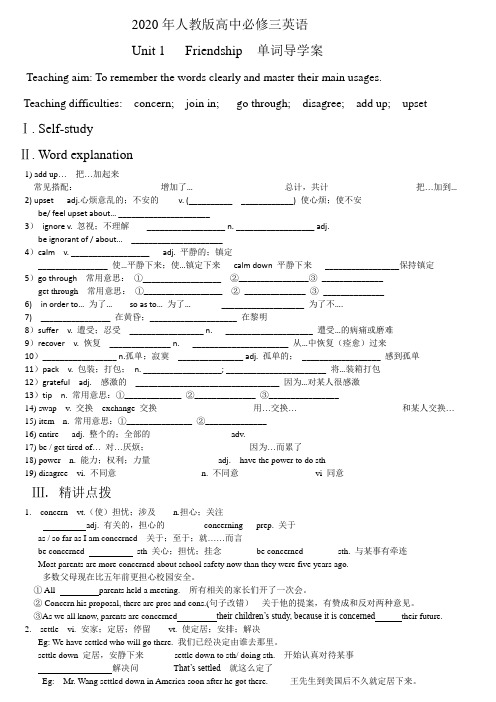
2020年人教版高中必修三英语Unit 1 Friendship 单词导学案Teaching aim: To remember the words clearly and master their main usages.Teaching difficulties: concern; join in; go through; disagree; add up; upset Ⅰ. Self-studyⅡ. Word explanation1) add up…把…加起来常见搭配:_________________ 增加了…__________________ 总计,共计_________________ 把…加到…2) upset adj.心烦意乱的;不安的v. (__________ ____________) 使心烦;使不安be/ feel upset about… _____________________3)ignore v. 忽视;不理解__________________ n. __________________ adj.be ignorant of / about…_____________________4)calm v. __________________ adj. 平静的;镇定________________ 使…平静下来;使…镇定下来calm down 平静下来_________________保持镇定5)go through 常用意思:①__________________ ②________________③ ______________ get through 常用意思:①__________________ ② ______________ ③______________6) in order to…为了…so as to…为了…___________________ 为了不….7) ________________ 在黄昏;____________________ 在黎明8)suffer v. 遭受;忍受_________________ n. ____________________ 遭受…的病痛或磨难9)recover v. 恢复______________ n. ______________________ 从…中恢复(痊愈)过来10)_________________ n.孤单;寂寞_______________ adj. 孤单的;__________________ 感到孤单11)pack v. 包装;打包;n. __________________; _______________________ 将…装箱打包12)grateful adj. 感激的_________________________________ 因为…对某人很感激13)tip n. 常用意思:①_____________ ②______________ ③________________14) swap v. 交换exchange 交换____________________用…交换…____________________ 和某人交换…15) item n. 常用意思:①_______________ ②______________16) entire adj. 整个的;全部的_________________ adv.17) be / get tired of…对…厌烦;____________________ 因为…而累了18) power n. 能力;权利;力量_____________ adj. have the power to do sth ___________________19) disagree vi. 不同意_________________ n. 不同意_____________ vi 同意Ⅲ. 精讲点拨1. concern vt.(使)担忧;涉及n.担心;关注adj. 有关的,担心的concerning prep. 关于as / so far as I am concerned 关于;至于;就……而言be concerned sth 关心;担忧;挂念be concerned _______ sth. 与某事有牵连Most parents are more concerned about school safety now than they were five years ago.多数父母现在比五年前更担心校园安全。
高中英语人教版必修三Unit 1 Grammar Modal verbs导学案 Word版缺答案
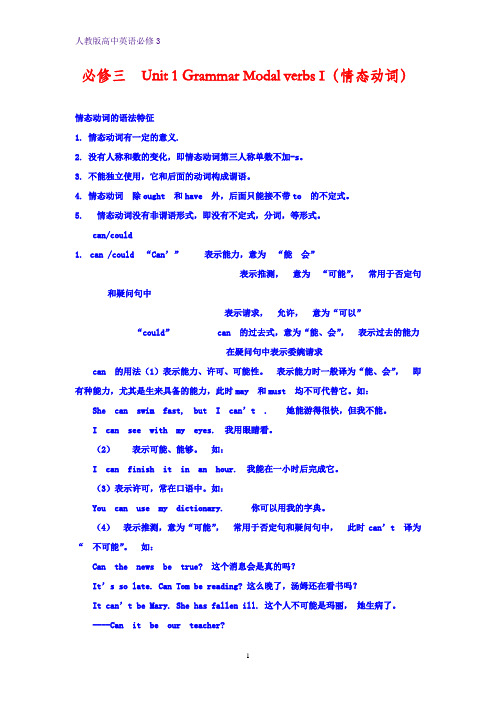
必修三Unit 1 Grammar Modal verbs I(情态动词)情态动词的语法特征1. 情态动词有一定的意义.2. 没有人称和数的变化,即情态动词第三人称单数不加-s。
3. 不能独立使用,它和后面的动词构成谓语。
4. 情态动词除ought 和have 外,后面只能接不带to 的不定式。
5. 情态动词没有非谓语形式,即没有不定式,分词,等形式。
can/could1.can /could “C an’” 表示能力,意为“能会”表示推测,意为“可能”,常用于否定句和疑问句中表示请求,允许,意为“可以”“could”can 的过去式,意为“能、会”,表示过去的能力在疑问句中表示委婉请求can 的用法(1)表示能力、许可、可能性。
表示能力时一般译为“能、会”,即有种能力,尤其是生来具备的能力,此时may 和must 均不可代替它。
如:She can swim fast, but I can’t . 她能游得很快,但我不能。
I can see with my eyes. 我用眼睛看。
(2)表示可能、能够。
如:I can finish it in an hour. 我能在一小时后完成它。
(3)表示许可,常在口语中。
如:You can use my dictionary. 你可以用我的字典。
(4)表示推测,意为“可能”,常用于否定句和疑问句中,此时can’t 译为“不可能”。
如:Can the news be true? 这个消息会是真的吗?It’s so late. Ca n Tom be reading? 这么晚了,汤姆还在看书吗?It can’t be Mary. She has fallen ill.这个人不可能是玛丽,她生病了。
----Can it be our teacher?那个人有可能是我们老师吗?----No, it can’t be our teacher. He is on a visit to the Great Wall.不可能。
2020学年人教版高中英语必修三Unit1词汇语法导学案
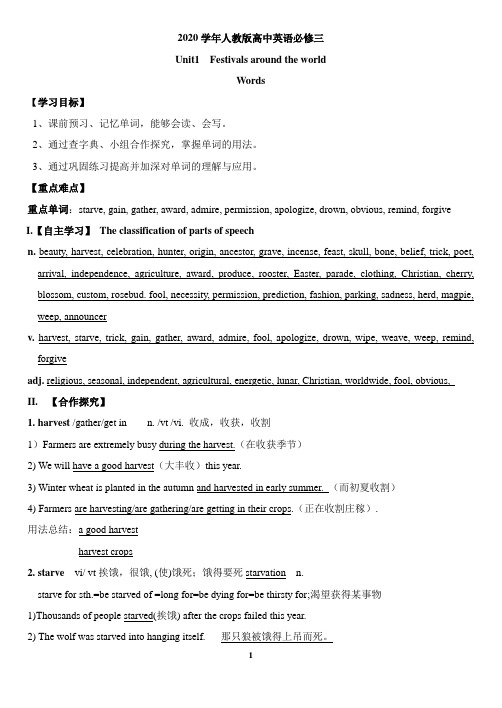
2020学年人教版高中英语必修三Unit1 Festivals around the worldWords【学习目标】1、课前预习、记忆单词,能够会读、会写。
2、通过查字典、小组合作探究,掌握单词的用法。
3、通过巩固练习提高并加深对单词的理解与应用。
【重点难点】重点单词:starve, gain, gather, award, admire, permission, apologize, drown, obvious, remind, forgiveI.【自主学习】The classification of parts of speechn. beauty, harvest, celebration, hunter, origin, ancestor, grave, incense, feast, skull, bone, belief, trick, poet, arrival, independence, agriculture, award, produce, rooster, Easter, parade, clothing, Christian, cherry, blossom, custom, rosebud. fool, necessity, permission, prediction, fashion, parking, sadness, herd, magpie, weep, announcerv.harvest, starve, trick, gain, gather, award, admire, fool, apologize, drown, wipe, weave, weep, remind, forgiveadj. religious, seasonal, independent, agricultural, energetic, lunar, Christian, worldwide, fool, obvious,II. 【合作探究】1. harvest /gather/get in n. /vt /vi. 收成,收获,收割1)Farmers are extremely busy during the harvest.(在收获季节)2) We will have a good harvest(大丰收)this year.3) Winter wheat is planted in the autumn and harvested in early summer. (而初夏收割)4) Farmers are harvesting/are gathering/are getting in their crops.(正在收割庄稼).用法总结:a good harvestharvest crops2. starve vi/ vt挨饿,很饿, (使)饿死;饿得要死starvation n.starve for sth.=be starved of =long for=be dying for=be thirsty for;渴望获得某事物1)Thousands of people starved(挨饿) after the crops failed this year.2) The wolf was starved into hanging itself.那只狼被饿得上吊而死。
2020学年人教版高中英语必修三Unit1单词导学案
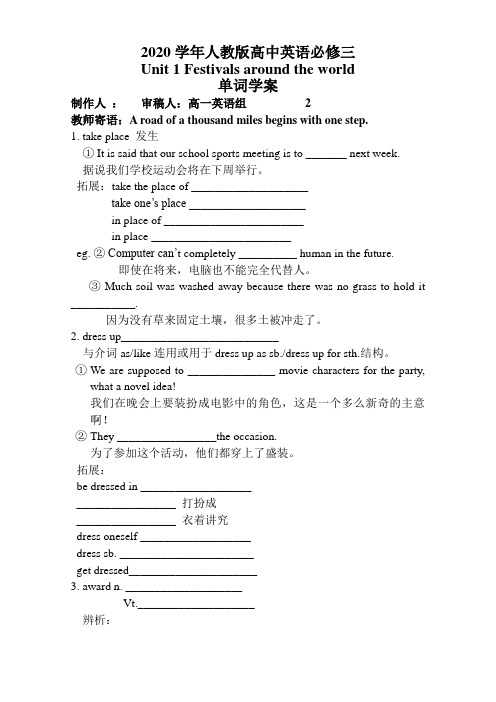
2020学年人教版高中英语必修三Unit 1 Festivals around the world单词学案制作人:审稿人:高一英语组 2教师寄语:A road of a thousand miles begins with one step.1. take place 发生① It is said that our school sports meeting is to _______ next week.据说我们学校运动会将在下周举行。
拓展:take the place of ____________________take one’s place ____________________in place of ________________________in place ________________________eg. ②Computer can’t completely __________ human in the future.即使在将来,电脑也不能完全代替人。
③ Much soil was washed away because there was no grass to hold it ___________.因为没有草来固定土壤,很多土被冲走了。
2. dress up___________________________与介词as/like连用或用于dress up as sb./dress up for sth.结构。
①We are supposed to _______________ movie characters for the party,what a novel idea!我们在晚会上要装扮成电影中的角色,这是一个多么新奇的主意啊!②They _________________the occasion.为了参加这个活动,他们都穿上了盛装。
拓展:be dressed in ____________________________________ 打扮成_________________ 衣着讲究dress oneself ___________________dress sb. _______________________get dressed______________________3. award n. ____________________Vt.____________________辨析:① Medals __________ to the best speakers on the debating team.奖金授给了辩论队中的最佳演说者。
2020年人教版高中英语必修三Unit1语法导学案无答案

2020年人教版高中英语必修三Unit1语法导学案无答案2020学年人教版高中英语必修三Unit1 Festivals around the worldGrammar——The usage of Modal Verbs编写人: 审核:全体英语组编写时间:【学习目标】学习情态动词的用法:——can\could, may\might, will\would, shall\should, must\can’t 【学习重点】掌握并使用情态动词【学习难点】如何在不同的语境中学会使用不同的情态动词【学法指导】①注意仔细观察所给例句的结构②通过反复练习掌握掌握其用法Learning Procedures:Step1 Lead-inEnjoy a song again and again, and then fill in the blanks using the proper model verbs.I want to be with youThere are things that be done That are not yet begunThings that I doWhen I want to be with youAlthough we be far apart You be with be in my heart No one else doI just want to be with youI want to be with youyou hear me?I need you near meI want to be with you I need you near me, my loveThe two of us be one Mother of my sonNo one else doI just want to be with youI want to be with you_____ you hear me?I need you near meI want to be with youI need you near me, my loveStep2 What is Modal Verb?1.定义:情态动词本身有一定的意义,表示说话人的某种感情或语气,对某动作或状态的某种态度,表示“需要”,“可以”,“必须”,“应当”等意义。
2020年人教版高中必修三英语Unit1全单元导学案设计(无答案)

No.1 Period One New words1.掌握本单元单词及重点词组,以及有关节日的单词及表达方式。
2.将单词,词组运用于语境,强化训练,达到熟练掌握的目的。
1.重点单词:mean ,permission, apologize, remind.2.重点短语:take place, turn up, keep one’s word, hold one’s breath, set off.互助合作,自主探究。
课前预习案一.自主预习P94本单元的单词短语二.根据预习写出下列单词短语【单词及短语默写】1. vt. 获得;得到2. n. 习惯;风俗3. adj. 明显的;显而易见的4. vt. 提醒;使想起5. vi.& vt.(使)饿死;饿得要死→ n.饿死6.______________ n 庆祝;祝贺→ _____________________ vt 庆祝;祝贺7. n.独立;自主→ adj.独立的;自主的8. vt.赞美;钦佩;羡慕→ n.羡慕9. n.许可;允许10.___________ n 到来,到达→__________ v到达【重点短语】11. 纪念;追念12. 盛装;打扮;装饰13. 玩得开心14. 使……想起……15. 好像,似乎16. 搞恶作剧;诈骗;开玩笑17. 期望;期待;盼望18. 出现;到场19. 屏息;屏气20. 出发;动身;使爆炸21.__________________发生;举办,举行22.______________日日夜夜课堂学习案1. mean 的用法1). mean doing sth.意味着【例句】Playing all the time means failing the exam.整天玩耍意味着考试失败。
2) mean to do sth. 打算或企图做……【例句】Sorry, I didn’t mean to hurt you.抱歉,我不是故意伤害你的。
2020年人教版高中必修三英语Unit1第一课时课前导学案设计(无答案)

2020年人教版高中必修三英语Unit1 Festivals around the worldPeriod one课前预习基础务实Ⅰ.单词检测1._____________ adj.遍及全世界的;世界性的2._________n.愚人;白痴;受骗者;vt.愚弄;欺骗;vi.干傻事;开玩笑;adj.傻的3.__________ n.许可;允许__________ v.允许;(使)成为可能4.__________ n.(汽车等)停放5.__________vi.道歉;辩白6____________vt.&vi.淹没;溺死;淹死7.__________ n.悲哀;悲伤8.__________adj.明显的;显而易见的9.__________vt.擦;揩;擦去10.__________ vt.提醒;使想起11.__________vt.原谅;饶恕Ⅱ.短语检测1._____fact事实上;实际上2._____ though 好像3.depend______依赖4.turn ____出现;到场5.keep one’s____守信用;履行诺言6.____one’s breath屏息;屏气7.set ____ 出发;动身;使爆炸8.remind...____...使……想起……Ⅰ.语境填词A.根据句意及汉语或首字母提示写出所缺单词1.The teacher gave me ____________ to go home early.(允许)2.I’ll never ____________(原谅) her for what she did.3.Dolphins have sometimes been known to save____________(快要淹死的) swimmers.4.Jack____________to Mary for not going to her party.(道歉)5.The professor made a few notes to____________ himself of what he wanted to say.(提醒)B.根据句意或所给的单词提示填空6. It’s ____________(fool) to believe what he said,as he is always telling lies.7.Memories and ____________(sad) came flooding over the 51-yearold man.8.She’s so ____________(obvious) cleverer and prettier than I am.9.He picked up some Spanish ____________ he was in Spain.10.It was obvious ____________ the girl did n’t like the design.Ⅱ.选词填空turn up,apologize to,fall in love,get married,forgive oneself,hold one’s breath,keep one’s word1.We invited her to dinner but she hadn’t ____________2.I must____________you for not being able to meet you.3.I can’t ____________for not seeing my mother before she died.4.The whole country ____________to see who would win the election.5.I believe in him because he always ____________.6.The young man ____________ with the girl at first sight.7.They ____________ secretly,and they were very happy.。
- 1、下载文档前请自行甄别文档内容的完整性,平台不提供额外的编辑、内容补充、找答案等附加服务。
- 2、"仅部分预览"的文档,不可在线预览部分如存在完整性等问题,可反馈申请退款(可完整预览的文档不适用该条件!)。
- 3、如文档侵犯您的权益,请联系客服反馈,我们会尽快为您处理(人工客服工作时间:9:00-18:30)。
2020学年人教版高中英语必修三Unit1 Festivals around the worldGrammar——The usage of Modal Verbs编写人: 审核:全体英语组编写时间:【学习目标】学习情态动词的用法:——can\could, may\might, will\would, shall\should, must\can’t 【学习重点】掌握并使用情态动词【学习难点】如何在不同的语境中学会使用不同的情态动词【学法指导】①注意仔细观察所给例句的结构②通过反复练习掌握掌握其用法Learning Procedures:Step1 Lead-inEnjoy a song again and again, and then fill in the blanks using the proper model verbs.I want to be with youThere are things that be done That are not yet begunThings that I doWhen I want to be with youAlthough we be far apart You be with be in my heart No one else doI just want to be with youI want to be with youyou hear me?I need you near meI want to be with you I need you near me, my loveThe two of us be one Mother of my sonNo one else doI just want to be with youI want to be with you_____ you hear me?I need you near meI want to be with youI need you near me, my loveStep2 What is Modal Verb?1.定义:情态动词本身有一定的意义,表示说话人的某种感情或语气,对某动作或状态的某种态度,表示“需要”,“可以”,“必须”,“应当”等意义。
【观察思考】Translate the following sentences into Chinese and pay attetion to the meaning of Modal Verbs.①You can smoke in the room. 你可以在房间吸烟②You must arrive on time. 你必须按时到达③We should obey the rules. 我们应该遵守规则2.基本特点:由以上例句看出:①情态动词本身都有一定的词义;②情态动词不能单独在句中充当谓语,必须和实义动词连用;③情态动词没有人称和数的变化;④情态动词后接动词原形。
Step3 The usage of modal verbs——can\could, may\might, will\would, shall\should, must\can’t【学前准备】Learn the following words about the functions(功能) of modal verbs.ability,advice,agreement,guessing,past habit,request,necessity,permission,possibility,prediction,promise, wish, willingness, determination1.can\could【观察思考1】①Can you speak Japanese?你能讲日语吗?此句中can表示能力(ability).②——Can/ Could I go now? 我可以出去吗?——You can go now, but he can’t.你现在能出去,但是他不能。
此句中can表示请求(request), 许可(permission).③It can be quite cold here in winter. 冬天这儿可能会相当冷。
此句中can表示可能性(possibility).④Someone is coming! Who can it be? 有人来! 可能是谁呢?此句中can表示推测(guessing).【自我探究1】从以上例句看出can 表示能力,请求,许可,表示理论或习惯上的可能性,推测。
注意:could可表示能力或可能性,多用于过去。
2.may\might【观察思考2】①——May/Might I ask you a question? 我可以问你一个问题吗?——Yes, you may. / Yes, you can. 是的,你可以。
此句中may\might表示请求(request), 许可(permission).②I may be busy from tomorrow on. 从明天起我可能会忙起来。
此句中may表示可能性(possibility).【自我探究2】从以上例句看出may\might 表示请求,许可, 可能性.3.will\would【观察思考3】①Would you pass me the book? 你可以给我递一下书吗?此句中would表示请求(request)。
②Go where you will. 去你想去的地方。
此句中will表示意愿(willingness)。
③When he was a child, he would often go skiing. 当他是个孩子的时候,他常去滑雪。
此句中would表示过去的习惯(past habit)。
【自我探究3】从以上例句看出will\would 表示请求,意愿,(例1, 2, )其中would 还可以表示过去的习惯(例3),相当于used to do sth.。
4. shall\should【观察思考4】①Shall we go out and have a picnic? 我们可以去外面野餐吗?②When shall he be able to leave the hospital? 他什么时候能离开医院?③You shall fail if you don’t work harder.如果你不努力学习你就会失败。
④He shall have the book when I finish reading. 我把书读完了他就可以读了。
【自我探究4】根据例①,例②,shall用于第一、三人称,表征求对方意见或请示(advice,request),用于疑问句中。
根据例③、例④shall用于第二、三人称,表说话人的命令、警告(order, warning)等强烈意志和决心。
【观察思考5】①You should go to the class right now. 你应该马上去班上。
②I’m on the bus. I should be back in five minutes.我现在在公车上。
大概5分钟之内到家。
【自我探究5】由例1可以看出should表示建议(advice),意为应该,由例2可以看出should还可表示预测(prediction),意为大概、估计。
5. must\can’t【观察思考6】①Everybody must obey the law. 每个人都必须遵守法律。
②Listen! The rat must be biting the wall. Now There must be a hole in the wall.听!老鼠一定在咬墙。
现在墙上一定有个洞。
③You mustn’t drive so fast in the street. 你千万不要在街上开得太快。
④Jack can’t be doing his homework, because I saw him go out.杰克不可能在做他的家庭作业,因为我看到他出去了。
【自我探究6】①must的意思是必须(necessity) (例1);②must表有把握的推测(guessing),意思是一定。
(例2)③mustn’t的意思是千万不要。
(例3)④must表示猜测, 否定式是can’t 或couldn’t.(例4)【针对训练】Task1: Read the text on page1 and find out the sentences using the Model Verbs.And then discuss how the model verb is being used.1) The most ancient festival the end of cold weather ,……...最古老的节日总是庆祝严寒的结束……….2) Some festivals are held to honour the dead or to satisfy the ancestor, whomight return either to help or to do harm .有些节日,是为了纪念死者,或者使祖先得到满足,因为祖先们有可能回到世上(给人们)提供帮助,也有可能带来危害。
3) For the Japanese festival Obon, people should go to clean gravesand light incense in memory of their ancestors.有日本的盂兰盆节,人们要扫墓、烧香,以缅怀祖先。
4) They also light lamps and play music because they think that this will lead theancestors back to earth .他们也点起灯笼,奏响乐曲,因为他们认为这样可以把祖先引回到世上。
5) Festivals can alse be held to honor famous people .有些节日也可以是纪念名人的。
6) Harvest and Thanksgiving festivals can be very happy events .收获节和感恩节是非常喜庆的节日。
7) Some people might win awards for their farm produce , like the biggestwatermelon or the most handsome rooster.有些人可能因为他们的农产品而获奖,比如最大的西瓜或最帅的雄鸡。
